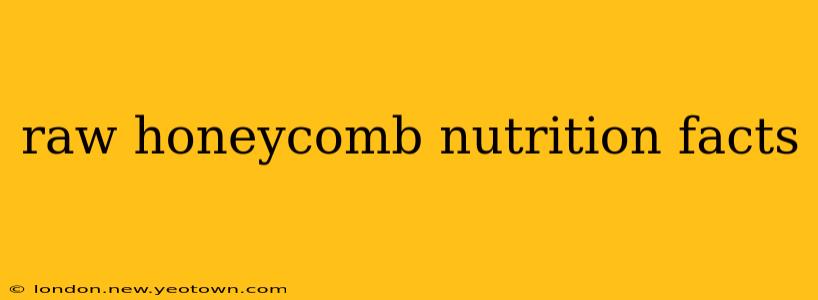Honeycomb, that golden, waxy masterpiece of nature, isn't just a beautiful sight; it's a powerhouse of nutrition. Imagine biting into a piece, the delicate sweetness exploding on your tongue, the satisfying crunch of the wax contrasting with the gooey honey. But beyond the delightful sensory experience lies a surprisingly rich nutritional profile. This article delves into the nutritional facts of raw honeycomb, exploring its benefits and answering some frequently asked questions.
What are the Nutritional Benefits of Raw Honeycomb?
Raw honeycomb offers a unique blend of nutrients compared to honey alone. It combines the goodness of honey with the added benefits of beeswax. While the nutritional composition can vary depending on the floral source and beekeeping practices, raw honeycomb generally provides:
-
Honey: A significant source of natural sugars (fructose and glucose), providing quick energy. It also contains small amounts of vitamins, minerals (like potassium and magnesium), and antioxidants. The type of flower the bees pollinated heavily influences the honey's specific nutrient profile.
-
Beeswax: Beeswax, the structural component of the honeycomb, isn't directly digested but contributes to the overall health benefits. It's rich in fatty acids, which some studies suggest may support healthy digestion and gut function.
What are the potential health benefits of eating raw honeycomb?
While more research is needed to solidify some claims, raw honeycomb's proponents suggest various potential health benefits, stemming from both the honey and beeswax components:
-
Energy Boost: The natural sugars in honey provide a rapid energy source.
-
Antioxidant Properties: Honey contains antioxidants which combat free radicals, potentially reducing the risk of chronic diseases. The type of honey, again influenced by the floral source, greatly impacts the antioxidant levels.
-
Improved Digestion (Potential): Some believe the beeswax can aid in digestion, though this requires more research.
-
Soothing Sore Throats: Honey is a traditional remedy for sore throats, and raw honeycomb might offer similar soothing properties.
-
Potential Antibacterial Properties: Certain types of honey possess antibacterial properties. This is often linked to the specific floral sources and the bees' environment.
How many calories are in raw honeycomb?
The calorie count in raw honeycomb varies depending on the amount of honey and beeswax present. However, a general estimate places it around 30-50 calories per tablespoon, predominantly from the honey's sugar content.
Is raw honeycomb good for weight loss?
While raw honeycomb provides natural sugars and energy, it’s not generally considered ideal for weight loss diets due to its calorie and sugar content. Moderation is key.
Is raw honeycomb safe to eat?
For most people, raw honeycomb is safe to eat. However, individuals with allergies to bee products (honey, pollen, beeswax) should avoid it. Additionally, always ensure the honeycomb comes from a reputable source to minimize potential contamination. Some people find chewing on the beeswax difficult, especially larger pieces, so consider this when consuming.
How to incorporate raw honeycomb into your diet?
Raw honeycomb can be enjoyed in many ways:
-
On its own: Simply savor the raw honeycomb as a treat.
-
With yogurt or cheese: The sweetness complements creamy textures beautifully.
-
In smoothies: Add small pieces for a textural and nutritional boost.
-
As a topping for desserts: Sprinkle it on ice cream, cakes, or other treats for an elegant touch.
Remember, moderation is key. While raw honeycomb offers potential nutritional benefits, it's best enjoyed as a part of a balanced diet.
Disclaimer: This information is for educational purposes only and does not constitute medical advice. Always consult with a healthcare professional before making any changes to your diet, especially if you have any underlying health conditions or allergies.

